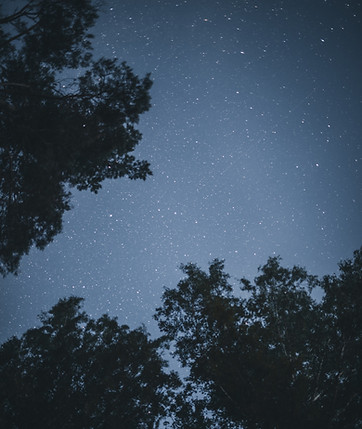
Why Dark Skies?
Humans are creatures of light; however, in our modern society, we have lit up the night excessively. We all know of circadian rhythm and how important light and dark cycles are to our mental and physical health. The sights, sounds, and smells of night and dark skies also connect us spiritually to the universe and the natural world, inspiring introspection. Artificial light in our communities also affects wildlife movement, behavior and proper function of natural ecosystems.
What changed?
Many residents move to West Newbury to enjoy its rural and natural landscape. An important part of this natural landscape is natural light and darkness. As more people move to Town, we need to be intentional in preserving our dark skies as much as our Open Spaces. While LED technology has advanced energy conservation, it also increased brightness and glare in overall outdoor lighting.
Both LED, and metal halide fixtures contain large amounts of blue light in their spectrum. Because blue light brightens the night sky more than any other color of light, it’s important to minimize the amount emitted. Exposure to blue light at night has also been shown to harm human health and endanger wildlife.
Why Dark Skies?
Do you remember camping out under a starry night sky or watching fireflies on a hot summer night? What night sights, sounds, and smells do you associate with dark skies. Below are some reasons for preserving darkness (adapted from darkskyparks.org.
• To inspire awe, curiosity, and spiritual connection to our environment.
• To appreciate the integrity, character and beauty of rural landscapes.
• To preserve wildlife migration, natural animal behavior, and circadian rhythms.
• To help preserve the intangible heritage that relates to mythology, traditional navigation, ceremonies and cultural heritage related to the night sky.
• The protect human health, both medical and psychological.
• To contribute to energy efficiency.
• To benefit scientific and amateur astronomy (starlight tourism) and the right for all people to enjoy a clear, unpolluted night sky.
• To improve personal security through non-glare lighting.


Join the Movement:
To help protect starry nights in West Newbury or your community, follow these general guidelines for your outdoor lighting.
-
Use warmer lighting for outdoors (look for bulbs with color temperature of 2700 Kelvins or less).
-
Use dimmable options when possible.
-
Shield the bulb to:
-
Reduce glare
-
Reduce uplight
-
Focus light where you need it
-
-
Shut lights off when not needed and install motion detectors or timers where appropriate.
To promote dark skies in West Newbury and adjacent communities:
-
Turn off lights from 11pm- 6am during bird migration: April-May, Sept-October.
-
Talk to your friends and neighbors about importance of dark skies and alternative lightning.
-
Help WN2 plan night events to enjoy the dark skies (star gazing, firefly watch) or host your own with family & friends.
-
Learn about what other dark skies communities have implemented.
-
Learn about model town ordinances
-
Join Firefly Watch: https://www.massaudubon.org/get-involved/community-science/firefly-watch

Perseid Meteor Shower, Haitong Yu via Getty Images
Resources:
Resources on impact of light pollution:
-
Dark Sky International: https://darksky.org/
-
Pennsylvania Outdoor Light Council: https://www.polcouncil.org/
-
Pembroke Starry Night: https://www.pembrokeshirecoast.wales/things-to-do/outdoor-activities/dark-skies/starry-skies-pembrokeshire/#What_Starry_Skies_Pembrokeshire_Partnership_has_done_so_far
-
Learn about lighting (presentations): http://www.polcouncil.org/download_presentations.html
Take Action:
-
Lights Out for Birds: https://birdcast.info/science-to-action/lights-out/
-
International Dark Sky Week: https://idsw.darksky.org/
-
Dark Sky International: https://www.darksky.org/
-
guidance on ordinances, & codes: https://www.polcouncil.org/polc2/municipal.htm
-
Lighting guidance for residential houses (Rockport): https://www.rockportma.gov/DocumentCenter/View/326/Residential-Lighting-Bylaw-Information-PDF
Dark Sky Towns & Parks
-
List of communities: https://www.darksky.org/our-work/conservation/idsp/communities/
-
Colorado June is Dark Sky Month: https://www.darksky.org/5-reasons-why-june-is-a-big-month-for-dark-skies-in-colorado/
-
Flagstaff, AZ, Dark Sky City: https://www.flagstaff.az.gov/4042/International-Dark-Sky
Discover more:
-
Dark Sky Community designation boosts tourism: https://www.washingtonpost.com/lifestyle/travel/dark-skies-designation-tourism-stargazing-astrotourism/2021/12/02/416b1466-4d43-11ec-b73b-a00d6e559a6e_story.html
-
Attract more fireflies to your backyard. https://www.startribune.com/want-more-fireflies-in-your-yard-small-steps-can-keep-them-glowing-for-years-to-come/600072644/
-
https://www.health.harvard.edu/staying-healthy/blue-light-has-a-dark-side
-
From IDA website: https://www.darksky.org/light-pollution/human-health/
.png)
